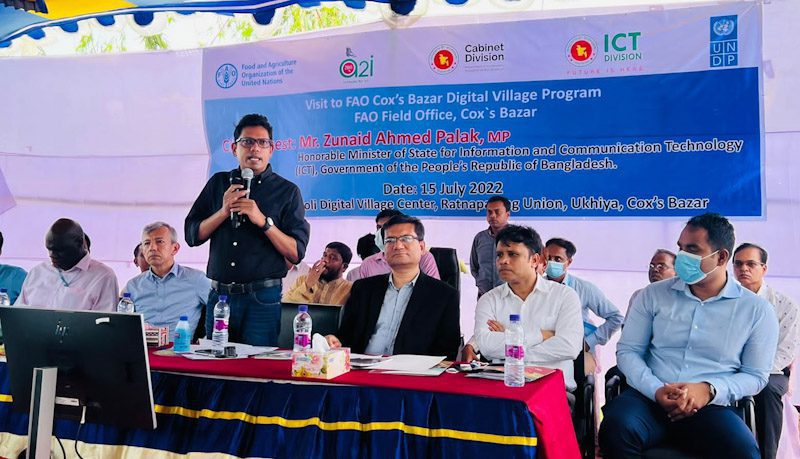The government is working relentlessly to improve agricultural productivity, land-based resource management, food security, and incomes of food and agricultural value chain actors and rural entrepreneurs and rural household’s livelihoods and well-being through digital innovations. Hon’ble State Minister for Information and Communication Technology (ICT) Minister, Mr. Zunaid Ahmed Palak, MP visited Tulatali Digital Village Center of Ratna Palong Union of Ukhia Upazila of Cox’s Bazar to witness the activities of Digital Village Center of Food and Agriculture Organization (FAO) of the United Nations to break the digital divide in rural areas and support the smallholder farmers. After visiting the ‘Digital Tulatali Village Cum Aggregation Center, ICT Minister joined at a views-exchange meeting organized by a2i and FAO on Friday. Policy Advisor of a2i Mr. Anir Chowdhury and Deputy FAO Representative in Bangladesh Mr. Eshonov Bakhodur were present in this meeting as special guests.
In his remarks as the Chief Guest ICT Minister Mr. Zunaid Ahmed Palak, MP, said, building a strong economy by modernizing Bangladesh in agricultural technology is one of the visions of the government. The government provides direct support through a2i and mega plans like ‘My Village My Town’ to upgrade villages. He said a2i’s Union Digital Centre (UDC) and FAO’s Digital Village Centre (DVC) would be connected to form a strong eco-system so that it is possible to change the lives of marginalized people and farmers radically. So far, marginalized and underprivileged citizens have received more than 61crore services from 8363 digital centres across the country. Mentioning a2i’s ekShop and Ekpay contribute to the economic development of marginal and rural people, ICT State Minister said, the first function of the digital centre is to connect the market with the farmer or producer. As a result, farmers and sellers save significant money and time in bringing the products to the marketplaces. Farmers are getting fair prices for their crops. Besides, in this digital village centre, the people of the village can easily get their job, academic admission, information, or health or financial services easily using the internet and technology. He added that ekShop e-commerce ecosystem chain is connected with more than 10,000 entrepreneurs and more than 6,500 digital centres across the country. Besides, Bangladesh’s first open agricultural marketplace ‘Food for Nation’ (foodfornation.gov.bd) has been launched to ensure proper marketing of the country’s food grains and agricultural products, ensuring fair prices, and continuing the food supply chain in emergencies. More than 4,000 farmers and many others connected to the supply chain are now using the platform.
Special guest of the event, a2i’s Policy Advisor Mr. Anir Chowdhury said, the journey of Digital Bangladesh started from the Union level. Today, it is being developed at the rural level to ensure last mile development. We can see farmers getting market linkages due to market aggregation with farmers in Digital Village Centres (DVC). These centres need to be rolled out nationwide, and it needs to be ensured that these DVCs are sustainable. For this, non-governmental organizations like FAO must work with the concerned government ministries. The government is utilizing and encouraging innovations in the field of agriculture while giving training to farmers in the reality of the modern technological world.
Emphasizing the importance of information technology to manage supply and demand better and increase productivity, Deputy Country Representative of FAO Bangladesh Mr. Eshonov Bakhodur said, combinations of satellite imagery, artificial intelligence, big data, growth, and development tracking technologies for plants and animals, automatic weather and soil moisture monitoring, blockchain technology, IoT, Robotics, Cloud Computing, and many others tools will provide tremendous opportunities for making more efficient, optimal agricultural decisions, helping farmers navigate climate change, volatile weather patterns and explore on new business models. I am pleased to note that many of these technologies are already widely used in Bangladesh. The FAO Regional Office for Asia and the Pacific developed this DVC framework to support existing and potential digital villages, increase farm productivity and profitability, and combat hunger, poverty, and inequality in rural farming communities, he added.
In total, there are 60 DVCs across Barishal, Rangpur, and Cox’s Bazar. Producer organizations are operating these DVCs and maintain 57 Virtual call centres to aggregate produce for collective marketing and facilitate bulk procurement of agricultural inputs. These Digital Villages promote 23 digital agriculture applications developed or supported by the government and provide rural farmers with digital literacy training to take advantage of new opportunities. Digitizing the agricultural value chains, especially for small-scale producers, requires business acumen; FAO claims to provide a full range of support in this area – from production to distribution.

